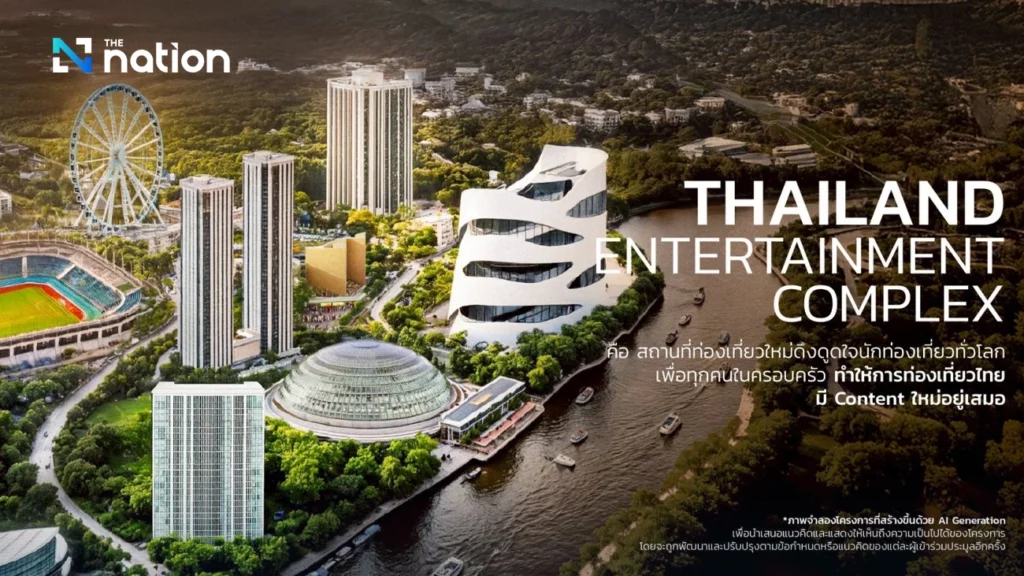
Government pledges strict regulation of integrated resort project expected to boost GDP by 0.8% annually and triple tourist spending
Thailand’s government has unveiled ambitious plans for a world-class entertainment complex featuring strictly regulated casino facilities, aiming to transform the kingdom into a global tourism hub and address seasonal visitor downturns.
Speaking at a press conference on Wednesday, Deputy Secretary-General to the Prime Minister Suksit Srijomkwan outlined the “Thailand Entertainment Complex” project—a comprehensive leisure destination designed to significantly boost tourism revenue and mitigate the impact of the annual low season.
The initiative, chaired by Deputy Finance Minister Julapun Amornvivat, represents a strategic shift to stimulate Thailand’s economy through private investment, with a minimum commitment of 100 billion baht required from prospective operators.
Addressing seasonal tourism challenges
The complex aims to provide year-round attractions during periods when Thailand’s natural destinations lose appeal, particularly the mid-year low season characterised by hot and wet weather that typically sees visitor numbers decline.
“The Rajamangala and Supachalasai stadiums were not designed for world-class concerts, lacking suitable roofing and having open spaces,” Suksit explained. “A dedicated indoor stadium would resolve issues such as the recurring six million baht cost of re-turfing Rajamangala Stadium after each event.”
The development will include exhibition centres, large-scale concert venues, museums, water parks, and amusement parks inspired by global leaders such as Disneyland and Universal Studios.
Additional facilities will encompass high-end restaurants, OTOP (One Tambon One Product) centres, and business incubation hubs.
Strict gambling controls emphasised
Officials were keen to stress that casino facilities will operate under stringent regulations and will not be universally accessible.
Suksit emphatically stated the project bears no connection to online gambling, with the government committed to tackling illegal online gambling websites.
“It is not a ‘free casino’ or ‘liberalized gambling’ project. The integrated casino facilities will not be open to all and will be subject to stringent anti-money laundering measures and robust security protocols,” he said, ensuring transparent and secure investments.
He noted that Thailand’s model, akin to Singapore and Japan, will attract mega-investments of at least hundreds of billions of baht, limiting the number of licenses and mandating extra-large (XXL) investments coupled with world-class regulatory standards.
Projected economic impact
Government assessments estimate the complex will generate between 12.04 billion and 39.25 billion baht in annual state revenue, including tax income from five-star hotels and theme parks.
These revenues will be allocated to support education, youth development (music, sports, technology), public health, aid for vulnerable groups, and the promotion of CSR and community development in surrounding areas.
Tourist spending is projected to increase dramatically from the current average of 6,000-7,000 baht per trip to approximately 22,000 baht, whilst Thailand’s GDP is expected to grow by 0.23% during construction and 0.2-0.8% after opening, while generating 100-200 billion baht in tourism revenue.
Additionally, the project will create over 9,000-10,000 direct jobs, with the potential for significantly more, especially when compared to Marina Bay Sands alone, which employs 12,000 people. Emphasis will be placed on hiring Thais and utilizing domestic construction materials and products.
Learning from Singapore’s model
Suksit highlighted Singapore’s entertainment complex success, noting such developments contribute 1-2% to GDP, attract 300 billion baht in foreign investment, and create roughly 20,000 jobs. Singapore saw 47% tourism growth between 2010 and 2022 following its integrated resort openings.
The regional market potential appears substantial, with 2022 revenues from integrated entertainment resorts reaching 320 billion baht in South Korea, 1.2 trillion baht in Macau, and 430 billion baht in Singapore.
“Our neighboring countries are becoming increasingly competitive by creating new man-made destinations, which almost every country in this region already has. Thailand is considered to be starting 10 years later, but the advantage is that we have learned from them about the benefits and drawbacks of each model,” Suksit noted.
Furthermore, Thailand’s strong potential in natural tourism, culture, infrastructure, and a tourist base of over 30 million visitors provide a competitive edge.
Private investment and timeline
Investment will be entirely private sector-funded, with companies required to be registered in Thailand and present comprehensive investment and operational plans.
Bidding companies may form consortiums to cover various business segments within the complex.
Julapun expressed confidence the Entertainment Complex bill will be finalised within Prime Minister Paetongtarn Shinawatra’s remaining two-year term, with House of Representatives discussions scheduled for July.
“Once it is listed as Agenda 1 and a committee is appointed, it will follow the legal process and is expected to be completed within the term of the current government, or by 2027,” Julapan stated.
He added, “However, if the bill is not finalized by this government, it would effectively revert to the starting point if a new government rejects it.”
Despite potential hurdles, Julapan expressed confidence in the bill’s passage.
“The government is not concerned that the law will not be approved by Parliament, as it was proposed by the Cabinet, which holds the majority in Parliament. We are also confident that we can clarify and foster understanding with all dissenting parties, and expect it to be completed within two years,” he stated.
Several prominent global entertainment complex operators have already expressed interest but await clarity on the legal framework, particularly regarding anti-money laundering provisions that could impact operating company credibility.
He noted that in recent months, over four leading international integrated resort developers have sought meetings with Thai officials.
Discussions have already taken place with two prominent companies: Wynn Development, owner of Wynn Resorts, and MGM Resorts.
Meetings are also being arranged with other entertainment industry operators, including stadium owners and event organizers.
“The two investors we’ve spoken with have shown significant interest in investing in Thailand. They also estimate that Thailand has the potential to become the world’s third-largest Entertainment Complex within the next 5-10 years, trailing only Las Vegas in the United States and Macau,” Julapan remarked.
He acknowledged that despite various concerns, all stages of the project will be transparent, fully supported by law, backed by data, and subject to strict oversight.
Source: The Nation
